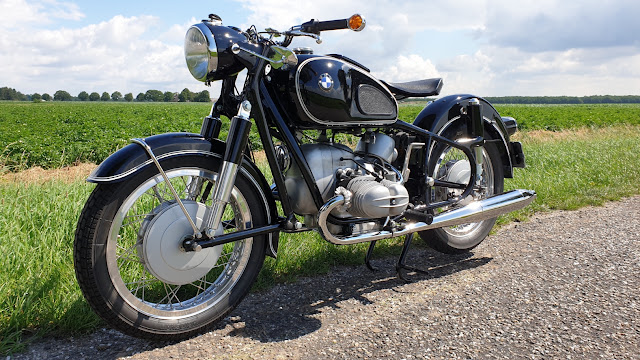BMW R69S 1968
After I owned a BMW R60/2 I
was looking for a BMW
/2 conversion, preferably a R/2 frame with a R75 engine.
I had already
seen several, but if you are looking for such a bike, you cannot find one.
Several bikes in
parts but they were all missing the sheet metal parts.
On my search I
came across this beautiful R69S.
It had only 2
owners since 29-03-1968 when it first hit the road.
The motorcycle
was made on 07-09-1966 and delivered to the Dutch importer Hart Nibbrig &
Greeve N.V. in Sassenheim on the 15-09-1966
The first owner
had it in his possession for 13 years and the 2nd owner, a very nice lady, for
31 years until 2012, after which the motorcycle ended up in storage.
For some time
the motorcycle got restored by Harry Meijer
on behalf of Theo Terwel who did all
the paint work.
It got some
beautiful aluminum rims, a “Schorsch
Meier” Tank and a 12 Volt Alternator
Conversion Kit.
Carburetor:
The original 6v generator delivers
60 watts it was replaced by a 12v alternator witch delivers 200 watts.
This system does not affect
the (Bosch magneto) ignition system that came standard on the /2
So you will be able to run
the engine on one cylinder for tuning.
After the first run fuel was
dripping out of the idle mix screw.
It turned out to be one of
the brass floats was cracked.
Cracking of the floats
results in the floats taking in fuel and becoming heavier and that caused the
overflow.
I replaced them with plastic
(7 gram) floats.
500 Km service:
I Replaced all the fluids.
For the Engine I use Castrol
Classic XL30.
For the transmission, drive
shaft and final drive I use Millers oils Classic Gear Oil 80w90 GL 4
Carburetor:
One cable adjusting screw
was completely in and the other completely out and still the bike was not
running smooth.
I found out that there were
2 different Throttle cables, one from a R51/2-R68 and one from a R50/5.
For sure, that doesn’t work.
I will replace them with the
original parts.
Gearbox:
Downshifting from 4 to 3 and
3 to 2 was sometimes a problem.
At times it would pop out of
gear.
My first thought was that it
needed a proper run in because the gearbox was overhauled.
If one carefully inspects
the shift lever it seems to have been designed for the pin to go in from the
top. A review of my old books and photos
show it both ways. I suspect that BMW
designed it to go in from the top, the logical way. A close look at the lever shows that it has a
“flat” where one would expect the nut and washer to go. Later they found that a certain percentage
wouldn’t stay in gear due to the lever hitting the exhaust pipe. Rather than redesign the lever they just
switched the pin and solved the problem. (DuaneAusherman)















